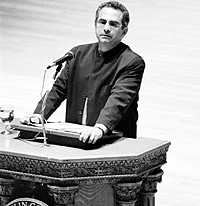

Greatness of man is hard to judge, but it wasn't difficult to sense the greatness of Jose Ramos-Horta as he spoke before hundreds Thursday night in Finney Chapel.
Ramos-Horta's visit was sponsored by Amnesty International.

Ramos-Horta captivated over 700 students with his amazing presence and stories of his war-torn homeland of East Timor. The Nobel co-laureate, who spoke with eloquence and patience, said, "We believe in the strength of popular opinion. When you don't have the power of money behind you, you can have the power of popular opinion."
Ramos-Horta is an international spokesperson for the East Timorese nationalist cause. East Timor has been fighting an Indonesian occupation since 1975. Since that time, over 200,000 people have been killed of the population of only 700,000.
Awarded the Nobel Peace Prize in 1996, Ramos-Horta told the story of his history with the prize. Years before he won it, he joked with a friend about his dream to be awarded a Nobel Prize in Literature. His friend assured him that he could fulfill this dream. "Do you realize I have not written a novel?" he asked that friend.
"That's not a problem," she replied.
The remoteness of East Timor was lessened when Ramos-Horta brought war home with his analysis of the situation in the Persian Gulf. "I heard last night on CNN that the US. always fought dictators. I was happy to hear that. We must always be open minded to new facts," Ramos-Horta joked.
Iraq used biological weapons against Iran in the 1980's. Ramos-Horta condemned their use and condemned Saddam Hussein. "He is a despot," he said. "He is less dangerous than Hitler because he has less power."
Ramos-Horta criticized the United States in the next breath, though, citing the inconsistencies in policy. "In the eighties, Iraq was an ally [of the U.S.]. It was the moderating influence in the Middle East."
"In the next few hours, few days, the U.S. will be bombing Iraq. I listened to a debate today, and I could not help but think how great this country is. No such debate could have been in England, nor in France. Last night we watched Americans speak their morality and their conscience," he said.
"The U.S. can do a lot of good by stopping arms concessions to developing countries," Ramos-Horta said. Although his own sister was killed by an American plane sold to the Indonesian government, Ramos-Horta demonstrated his overwhelming humanity by pleading for nations to forgive their aggressors.
"Forgiveness is a matter of heart, not a matter of legislation. A country that will not forgive and goes after its aggressors with a vengeance is sowing the seeds of its own demise," he said.
Though the violations against human rights have not ceased since Ramos-Horta was awarded the Nobel prize, he is very hopeful that change will come soon. "Today there is a window of opportunity. Indonesia is bankrupt. Now it's only a matter of time before the regime collapses completely," he said.
His belief in the imminence of the fall of Indonesian occupation of East Timor was accompanied by his theories of history. "Regimes of people come and go. People are the makers of history. They are the ones who are the government, who change and make regimes," he said.
At the podium: Nobel Peace Prize winner Ramos-Horta educated a packed Finney crowd about the war in East Timor on Thursday evening. (photo by Zach Fried)
Copyright © 1998, The Oberlin Review.
Volume 126, Number 15, February 20, 1998
Contact us with your comments and suggestions.